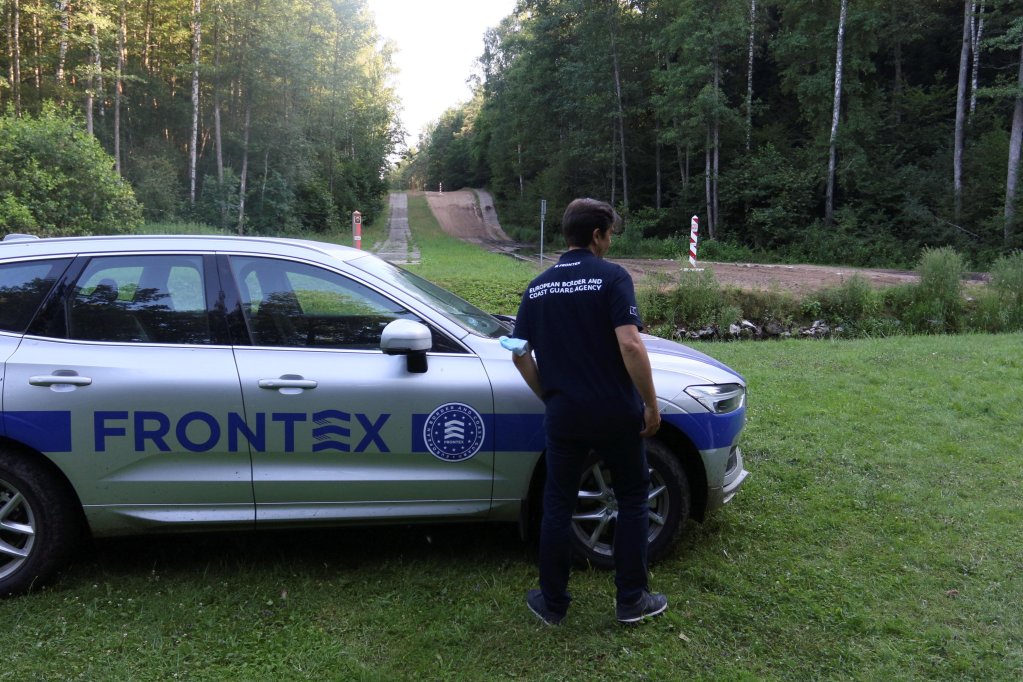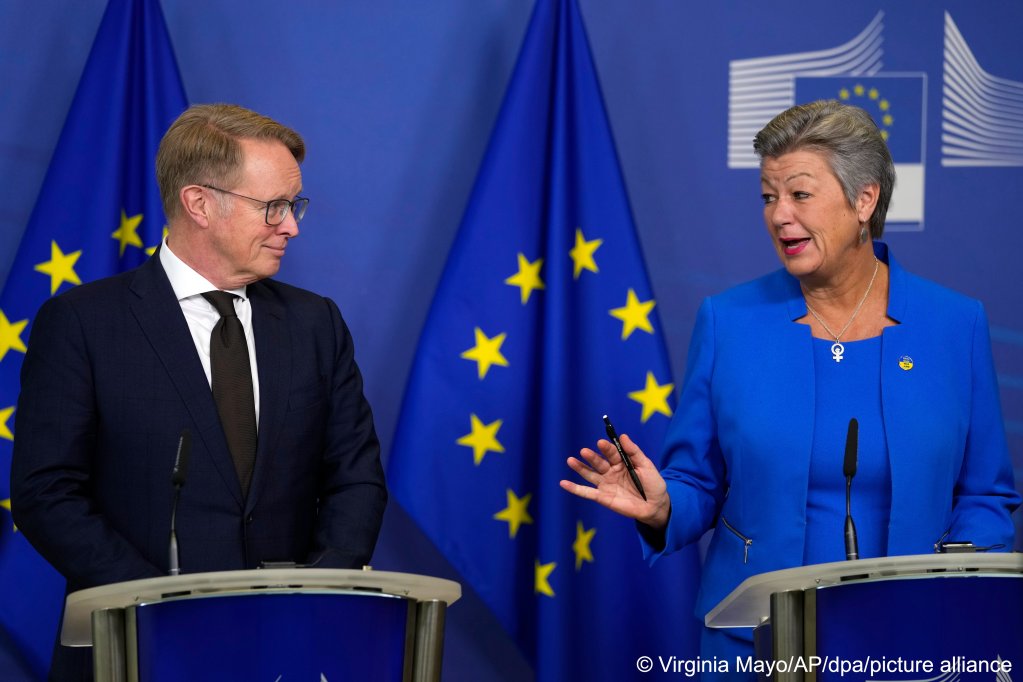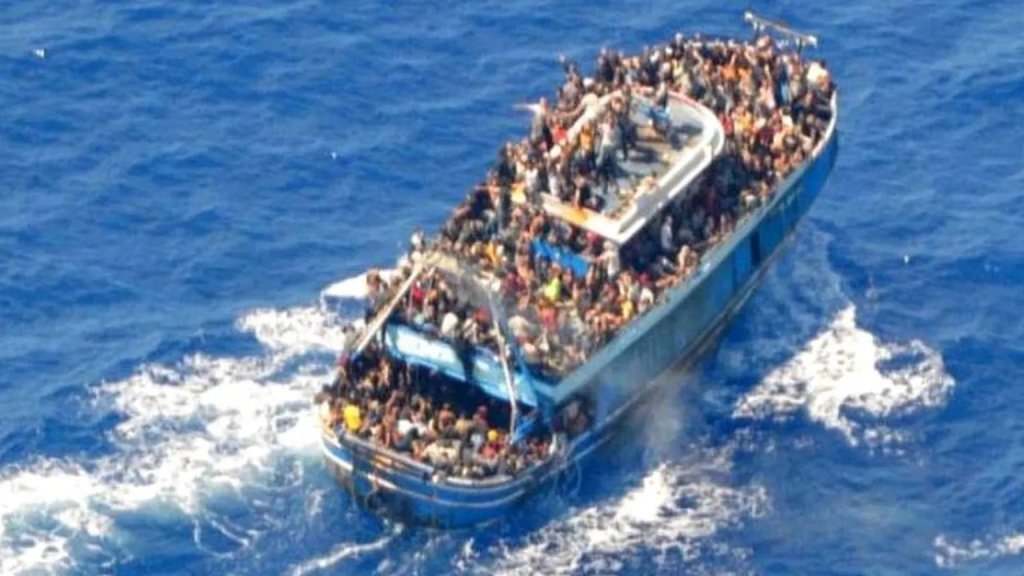In this explainer, InfoMigrants breaks down what Frontex is tasked with, how its operations are changing under new leadership, and what critics and human rights watchdogs say about how the agency carries out its mandate of border control.
Frontex, Europe’s border agency, warns in its latest annual risk analysis report, published on June 3, that protracted violence in Africa, the emergence of new smuggling routes, and increasingly tech-savvy criminal groups are making border security more difficult.
The risk analysis report aims to identify the "key risks to the EU's borders" for 2025 and 2026. In the foreword to the report, written by Frontex' exeutive director Hans Leijtens, Frontex underlines that "at a time of profound geopolitical uncertainty and evolving security challenges, the European Union’s external borders demand vigilance, adaptability, and above all, foresight."
The report also highlights the increasing use of fake documents and smaller regional airports to bypass controls, digital tools to evade detection, and hybrid threats such as disinformation campaigns as mounting security challenges for the European Union EU.
In light of these evolving security issues, questions about Frontex’s role, responsibility, and accountability remain as relevant as ever.
In this explainer, InfoMigrants breaks down what Frontex is tasked with, how its operations are changing under new leadership, and what critics and human rights watchdogs say about how the agency carries out its mandate of border control.
What is Frontex?
Frontex, also known as the European Border and Coast Guard Agency, was established in 2004 to coordinate border security among EU member states. In this sense, Frontex acts as the EU’s premier border guard, patrolling the bloc’s land and sea borders.
From starting out as a small EU agency with a few staff and a modest budget to support the border patrols of member states, Frontex’s role changed in 2015.
That year, the EU received 1.3 million applications for asylum. Nearly all of those applicants arrived in Europe through unofficial channels. Since its establishment, the annual Frontex budget has increased from six million euros to more than 900 million euros in 2024.

Frontex deploys thousands of uniformed personnel, supporting national authorities through joint patrols and surveillance operations by land, sea, and air. The agency operates aerial reconnaissance flights, maritime patrols, and land-based teams, using advanced tools like drones, thermal imaging, and real-time data sharing to monitor border activity.
What is Frontex supposed to do?
Frontex’s core responsibilities span several areas. It provides operational support to EU member states, sending staff and equipment to help countries manage pressure at their borders. It plays a central role in organizing both voluntary and forced returns of migrants who are not allowed to stay in the EU. It also collects and shares risk analysis and intelligence on migration flows and border threats across the EU.
Another important part of its mandate includes training and standard-setting for national border officials.
While member states maintain sovereign control of their borders, over the years, the agency’s responsibilities have gradually expanded.
Read AlsoEU looks to expand coast guard by 2027
Allegations involving Frontex
Over the years, and as its budget and mandate expanded, Frontex has been at the center of major controversies, especially around allegations of human rights violations. Investigations and media reports have linked the agency to so-called "pushbacks"—the illegal practice of forcing asylum seekers back across borders without processing their claims.
In 2021, a European Parliament investigation criticized Frontex for failing to protect human rights at the EU's borders alleging that Frontex had knowledge of the pushbacks at border hotspots such as the Greek-Turkish border but did nothing to ensure compliance with legal obligations. Additionally, the report said that in some cases, Frontex cooperated with the authorities carrying out the illegal pushbacks and collective expulsions.
In response, the European Parliament voted to freeze part of Frontex’s 2022 budget. Parliamentarians also demanded the recruitment of 20 fundamental rights monitors to watch what the agency was doing.
In 2022, giving in to pressure from European Parliament and human rights watchdogs, the agency’s then-executive director, Fabrice Leggeri resigned. Later, current director Hans Leijtens was appointed in 2023.
The controversy compelled Frontex to promise reform and increased transparency in its operations.
Is Frontex really changing?
In an interview with InfoMigrants, Krzysztof Borowski, Frontex spokesperson, described a shift in culture under the new leadership. "Border management and respect for rights must go hand in hand," he said.

Frontex has since expanded its Fundamental Rights Office, deployed more fundamental rights monitors to the field, and strengthened internal reporting systems for potential abuses. Officers are now expected to file serious incident reports, which are passed to the Fundamental Rights Office for investigation and recommendations.
Frontex has also stepped up efforts to press member states to follow through on these recommendations. As an example, in the case of Greece, Frontex is reviewing 12 cases of potential human rights violations by Greek authorities. Frontex has signaled it may reduce funding for co-financed patrol vessels if rights standards are not met. "This is a big shift for us. We’re using our position to apply more pressure," Borowski said.
Read AlsoFrontex examines fresh pushback allegations against Greek government
What about returns and reintegration?
One of the fastest-growing areas of Frontex’s work is managing returns. In 2023, the agency supported about 59,000 returns, nearly two-thirds of which were voluntary—meaning the individuals agreed to return to their countries of origin, often with logistical and financial assistance.
"Frontex does not make decisions about who must return; that is the responsibility of national authorities. But once that decision is made, Frontex organizes flights, often commercial ones, and helps ensure that returns are carried out in accordance with EU standards," Borowski said.
The agency also partners with NGOs to help returnees reintegrate into their home countries. Frontex has also developed guidance on how to communicate the return process to children and other vulnerable groups, including family-friendly materials and training for officers.
Borowski explained, "We’re trying to make a very difficult moment of a return a little easier, especially for vulnerable groups such as children."
How transparent is Frontex about its operations?
Despite all these changes, critics claim that transparency remains a flashpoint for the agency.
Last year, for example, human rights NGO Sea Watch released a report documenting several cases of Frontex’s alleged involvement in human rights violations in the Central Mediterranean from the air between 2022-2024. These alleged violations include not regularly informing rescue vessels about boats in distress in their vicinity and enabling militias such as the Libyan Coast Guard to intercept people at sea and facilitating pushbacks.
"As a result of the agencies' way of operating, people are forced back to torture, forced labor and exploitation," the Sea Watch report stated.
In 2024, the European General Court ruled that Frontex must reconsider its refusal to release aerial photographs from a surveillance operation, following a case brought by the NGO Sea-Watch. According to Frontex, the court did not order immediate release but said the agency had failed to adequately justify withholding the images.
"If Frontex is serious about ensuring trust and accountability, it must stop downplaying the court's ruling and instead release the withheld materials. Anything less continues to erode public confidence and allows a dangerous level of impunity at Europe’s borders," a spokesperson for Sea Watch told InfoMigrants.
Another case involved the Adriana, a fishing vessel carrying around 750 migrants which sank off the coast of Pylos, Greece, in 2023. Only 104 people were rescued; over 600 are presumed dead, making it one of the deadliest migrant shipwrecks in the Mediterranean.

In the aftermath, the European Ombudsman launched an inquiry into Frontex’s role in the incident. The inquiry found that while the agency followed existing protocols, those protocols displayed shortcomings when it came to responding to maritime emergencies. The alleged shortcomings included limited coordination with national authorities and insufficient involvement of fundamental rights monitors in decision-making during surveillance operations where emergencies are detected.
Frontex says it is seeking to strike a balance between openness and operational security. "We are still a law enforcement agency. We cannot reveal every aspect of our operations because it would jeopardize our ability to do what we need to do. If we show exactly where our planes fly, smugglers adjust their routes. We have to protect both people and methods," said Borowski.
"Frontex’s claim of confidentiality for security reasons cannot justify the lack of transparency, especially when human rights violations are at stake. Transparency is essential to ensure accountability at Europe’s borders. If Frontex is truly committed to operating within legal and ethical boundaries, it must stop hiding behind vague security arguments and release the requested information. Only then can public oversight and justice be ensured," a Sea Watch spokesperson said
Have there been improvements in operations?
Under its new leadership, Frontex says it is integrating fundamental rights considerations earlier and more centrally in its mission planning. Where such issues were once addressed at the end of operational negotiations, they are now being discussed upfront.
The agency has also started applying financial leverage—such as the possibility of withholding operational funding—to encourage compliance by national partners.
Whether these moves mark an institutional transformation or a tactical response to mounting scrutiny remains an open question.
"Changes take time. It’s like steering a cargo ship in a storm. But the direction has changed," said Borowski.
